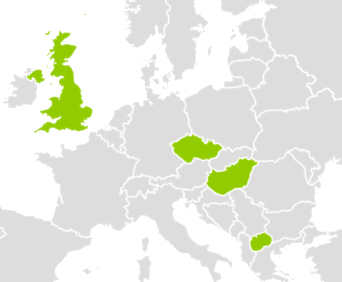The tested and reviewed learning content of the pilot course "Teaching agricultural informatics in agricultural vocational training" is published in the form of digital textbook (licensed under a Creative Commons Attribu-tion 4.0 International - CC BY 4.0) freely available for teachers and students alike.
The derived language versions will be local-ised to comply with the particular characteris-tics within target countries. See books here: http://agriteach.hu/en/content/o6-planning-valorization-and-sustainability
After finalization of the 3 modules of Teaching agricultural informatics in agricultural vocational training, pilot courses were organized in both target countries in Hungary and Macedonia in spring 2019. Read the following reports:
PILOT IN MACEDONIA
April 1, 2019 until May 6, 5 weeks, 20 teachers from seven VET schools across North Macedonia enrolled on the pilot course. Out of the 20 participants, 16 teachers from six different VET schools successfully completed the course.
For the first module, Teaching in the 21st century in Agricultural Vocational Schools, were lectures on web-based tools, flipped classroom model and methodological renewal of 21st century education. A total of 61 teachers from 22 VET schools in the country applied for the pilot training. The training was successfully completed by 51 of the teachers out of 61 participants from 22 VET schools.
Curriculum development has begun in the Agriteach 4.0 project, where full partnership is involved. Within the framework of the project, 3 modules will be developed, which will be available in the form of e-learning.
- M1 Reinventing agricultural education
- M2 European Strategies and initiatives of e-Agriculture
- M3 Digital systems within Agriculture 4.
After the completion of the curriculum, pilot trainings will be followed to test the course in Hungary and Macedonia among vocational teachers, expected at the end of 2018.

This project has been funded with support from the European Commission. This publication [communication] reflects the views only of the author, and the Commission cannot be held responsible for any use which may be made of the information contained therein.
No front page content has been created yet.
Project objectives
A focused needs-analysis, and comparative study to identify the training needs by involving VET teachers and representatives of the beneficiaries - the agricultural companies.
Developing a standard competency framework for agricultural workers and agricultural ICT practitioners aligned with EU standards such as the EQF and the e-Competence Framework.
In this activity the experienced educational developments partners (CAPDM and ITS) will collaborate to produce a detailed description of the ICT competences exhibited through tasks involving workers in the agricultural companies.
- M1 Reinventing agricultural education
- M2 European Strategies and initiatives of e-Agriculture
- M3 Digital systems within Agriculture 4.0
Refining the syllabus and the course components according to feedback from the participants.
The aim of this Outcome is to ensure sustainability of the project in every partner country, not just the two target countries. In the first activity the project will produce a digital textbook for all agricultural teachers, and based on the content developed during the project.


